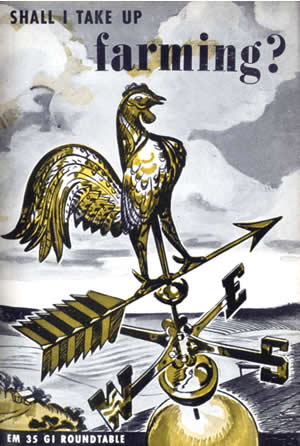By Anthony Netboy
Editorial Staff, Department of Agriculture
Everett E. Edward
Historian, Department of Agriculture
(Published April 1945)
 Table of Contents
Table of Contents
Are There Good Reasons for Being a Farmer?
What Does It Take to Be a Successful Farmer?
What Are the Lessons from the Last War?
Is World War II Bringing the Same Result?
Where Will New Farm Lands Be Located?
Will There Be Postwar Surpluses?
Introduction
During this war we have rarely heard that old tune, “How ya gonna keep ’em down on the farm, after they’ve seen Paree?” But if the melody does not linger on, the question does.
How many soldiers, coming from the farm, will return to it after they have seen London, Paris, Rome, Naples, Cairo, Manila, or a hundred other strange and fascinating places? How many, after serving in Europe, Africa, Australia, Asia, or the tropical Pacific islands, will return to their old home towns, their prewar trades or occupations?
A large number of men, their horizons widened by the war, will seek new experiences. Whether they were farmers, butchers, bakers, or candlestickmakers, their former occupation will no longer have the same appeal to them. But as great a number perhaps will be glad to go back to their old way of life.
Love of the soil is deep-rooted in many Americans. Only a century ago the United States was a predominantly agricultural country and the vast majority of people made their living from the land. Even now relatively few families have been separated from the farm for more than a couple of generations.
The number of people on farms in the United States remained almost stationary from 1910 to 1940—varying from approximately 30,000,000 to 32,000,000. Since 1940, however, the farm population has declined by over 6,000,000 persons. In 1944, about 1,650,000 had joined the armed forces, and 4,650,000 had moved into towns and cities to take war jobs or for other reasons.
It is reasonable to expect that not only a large proportion of the farmers now in uniform will return to the land, but that they will be joined by many young men who were not living on farms before the war. The chances are that the decline in farm population during the present war will be substantially made up when peace comes, especially if the present agricultural prosperity continues.
Related Resources

September 7, 2024
Travel and Trade in Later Medieval Africa

September 6, 2024
Sacred Cloth: Silk in Medieval Western Europe

September 5, 2024